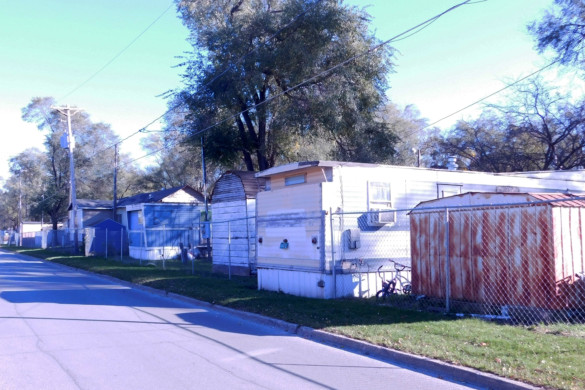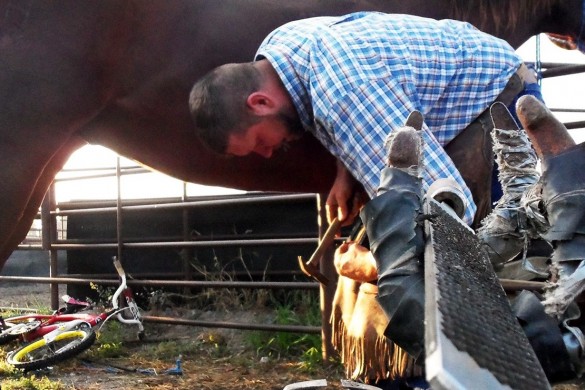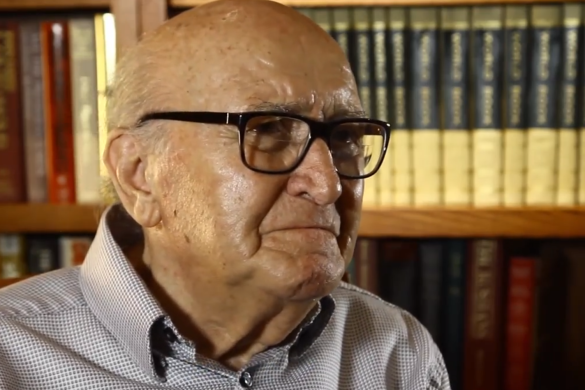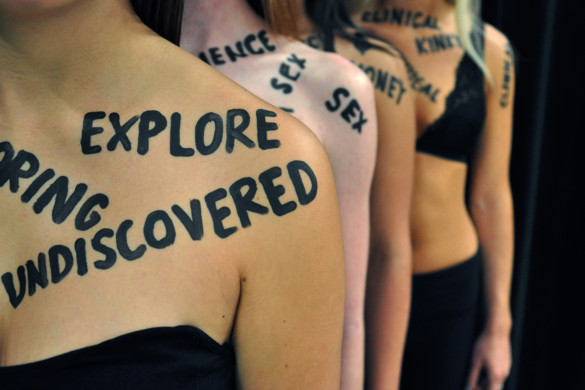Words by Avery Gregurich
Margaret, 35, pulls her mug shot up on her cell phone, slides it across the table.
Margaret is not her real name. In the photo, she had just been arrested for her ties to meth distribution. Her hair is thin. She is thin. There is no resemblance to the woman sitting across the table.
“I look at the picture and it’s like it’s not even me. When I tell my story, it’s like I’m talking about another person because it is so removed from who I am now.”
The picture was taken 11 years ago. It was the first and only time she became a felon. Since then, she’s held other titles: wife, mother, active church member and perhaps most importantly, employee. One thing still eludes her, though: voting.
“I’ve paid my debt. I’ve terminated my supervision. I’ve served my time in prison. What does that say? Am I not a human?” she asks. “That I don’t deserve to vote because of my past? When’s the debt paid? When is it over?”
–
Of the 50 U.S. states, 48 have some restriction on the voting rights of offenders convicted of felonies. (Maine and Vermont allow offenders in prison to vote.) States’ disenfranchisement laws run the gamut: from not allowing voting by either those currently incarcerated, those on parole, those on probation or those who have ever been convicted of a felony.
Iowa, along with Kentucky and Florida, permanently revokes the voting rights of former felons, requiring individual petitions sent directly to the governor’s office to restore voting rights. Florida currently holds the nation’s largest population of disenfranchised citizens with over 1.5 million, or more than 10 percent of Florida’s entire population.
And Kentucky?
“If you put everybody in Kentucky who had a felony conviction and couldn’t vote because of it in one city in Kentucky, it would be the third-largest city in Kentucky,” Tomas Lopez says. He serves as counsel for the Brennan Center for Justice’s Democracy Program at the NYU School of Law. Lopez describes widespread felony disenfranchisement as “one of the upshots of mass incarceration” and sees the laws as having drastic effects on not only presidential elections, but also more immediately at the level of communities.
“When people lose the right to vote they are obviously not able to vote for president, but they also aren’t able to vote for local offices,” Lopez says.
Margaret herself is considering the ramifications of this on the upcoming presidential election, not just in the purpose of the vote itself, but in the act of casting it. After getting out of prison, she divulged her felony conviction to all of her employers. But, she hasn’t told her current employer.
“I keep it very general on who I think I would lean towards. What do I tell my boss on voting day when I don’t have my sticker?” she asks.
This marginalization manifests itself in other ways beyond voting. Things like not being able to supervise her son’s school field trips when he’s older or having to keep her Facebook status updates about her sobriety vague to keep her employment prospects open. Still, she thinks about her son and the way that she and her husband, also a felon, can influence his belief in a system they cannot participate in.
“I would want him to have the love of politics that my husband has, but how can we instill that in him when neither of us can vote? That affects the example that we can set for him,” she says.
–
Her husband, Alan (also not his real name), is sitting at the desk in his office, scrolling through his life as chronicled by the charges listed on the Iowa Department of Corrections website. He counts aloud, tallying over 20.
His first felony was at the age of 13 for robbery. He says he “got on probation as a teenager and never got off.” In his 20s, he started using meth. The drug soon consumed him.
“It started basically a decade of chaos. I was heavily addicted to meth and supplemented that by stealing,” he says. “My thing was forgery, writing checks out and using credit cards that didn’t belong to me. Every check is a separate crime. You see that there are quite a few of them.”
He went to prison four times over the course of the decade. His last re-entry was four years ago.
“I drew a line in the sand,” he says. “I said, ‘I’m done doing all this stuff and I’m done living this way.’”
He reached out to the employer for whom he now works and was upfront about his criminal history. He says his supervisors may not know the full extent, but they do know that there was significant trouble earlier in his life. Now, he plays a major role in hiring new employees. He and his company wait until the interview process before asking applicants about their criminal histories. But, he is fearful of a future where any job interviews don’t allow him the same decorum. He’s concerned about the question on most job applications that asks about felony convictions, the one in which applicants have to check ‘the box’ that discloses their criminal history.
“My biggest worry is if I found myself without a job and I had to evaluate how to provide for my family at a level that I am now with what types of jobs that actually hire felons. There are a lot of doors that can’t open because of the box,” Alan says. “I’m a damn good employee and I work hard for my company, felony or no felony.”
As for voting, Alan has seen the stack of paperwork his wife has brought home to get her rights back. And she has just one offense. Veronica Fowler, the communications director for the ACLU of Iowa says the application process is “complex” and time consuming. Often applicants must keep a lawyer on retainer during the months-long process.
The application itself requires proof of payment of restitution, court costs and other fines accrued by the offender. It also includes four blank lines where offenders are asked to state “why they believe they’ve demonstrated good citizenship such that your citizenship rights might be restored by the Governor.”
What would he say to the governor, if he were sitting here in his office?
“I’d say, ‘I have a terrible criminal history, and it’s embarrassing, and it’s directly drug-related. Every single crime was committed in the act of obtaining drugs. I’m not a thief by nature. I was doing it to feed my addiction,’” he says.
He gestures to the list of his offenses on his computer screen and says, “I understand that that is there.” Then he points to himself: ”But this is here.
“I’ve always operated under the philosophy that I’ve done a lot of bad, but maybe if I do a lot of good, maybe I can tip the scales back in my favor before it’s all said and done,” he says.
–
Jack Petsche, 26, is a quick-talking, deeply intelligent man. He works at two non-profits and is starting a third: a residence for people coming out of prison to reintegrate back into society for free.
“Guys get out, they can’t pay rent because they can’t get a job. They rack up thousands of dollars in debt, and they have no hope,” he says. “You can trace back a lot of the recidivism to guys getting out and not being able to find jobs.”
Based on an Iowa Department of Corrections report, 31.9 percent of offenders reoffend and return to the prison system after getting out. He was raised on Des Moines’ east side, in an impoverished and high-crime neighborhood. Growing up as a member of the Des Moines Catholic Worker House, he was taught to complete the works of mercy, and he participated in radical leftist politics.
“I got involved in criminal life and drugs at a young age,” he says. “I became a part of the criminal class and was very aware of that class predicament.”
At 17, he held up a gas station and was convicted of first-degree armed robbery. He did five years in prison for it. Being inside and seeing the ineffectiveness of rehabilitation programs and re-entry practices gave Petsche an entirely new outlook on the criminal justice system.
“The primary goal of criminal justice is certainly not rehabilitation in any sense of the word. Its primary goal is very, very clearly punitive,” he says. “This is a tremendously flawed system. It doesn’t benefit the taxpayer, it doesn’t benefit the individual, it doesn’t make us any safer.”
For drug treatment classes, they would watch movies about drugs like Blow.
“It would be abundantly clear if anybody sat in on these treatment classes that they are not in any way geared towards rehabilitation,” he says. “They are just filling a quota.”
When he re-entered society, he had difficulty finding work.
“I’ve had probably five places that have offered me management type jobs and then subsequently my background check came back, and they rescinded the job offer,” Petsche says. “I couldn’t get a job at McDonald’s. I couldn’t get a job at Walmart.“
He says he won’t petition Iowa Gov. Terry Branstad for his voting rights because by simply participating in the process, former felons are further disenfranchising themselves.
“They force you into this dichotomy of you either accept it and further the legitimacy of the state by voting, or you are denuded of any agency in the system, and they use that against you.”
–
Sammy Archer, 42, is standing in the kitchen of a home he is fixing up in Des Moines’ east side. Just around the corner at what is now a liquor store, he watched his friend kill a man in a gas station robbery. For his part in the robbery, he was given a charge of second-degree murder.
“I caught my first felony when I was 15 years old,” he says. “I couldn’t even smoke when I got to prison, but I had a 50-year adult sentence. I had to get my mom’s permission to smoke a cigarette.”
When he got out the first time, he found himself ill-prepared for life outside the walls.
“I was 28 years old when I walked out for the first time. I was still 15 years old in a 28-year-old’s body,” he says. “If I could smoke it, I’d smoke it. If I could snort it, I’d snort it. If I could stick in a needle, I’d stick it in my arm.”
Standing in the kitchen now, though, he says that life of drugs and crime is over. He talks about getting high a final time right after he got out of prison the last time. Immediately, he turned back into “the scum of the earth.”
“I have no fear of ever using drugs again,” he says. “It’s just not in my makeup anymore.”
He’s formed a sort of informal support group with other former felons with whom he did time. He says they keep each other accountable and remind each other of all they have outside the walls. Before speaking with him tonight, here in his kitchen, he was talking to a man he used to do drugs with.
“I told him, ‘Don’t you like sleeping?’ We used to stay up two or three weeks at a time. I said, ‘Don’t you like hearing that alarm go off and knowing that you get to go out and make some money? Even if you don’t like the job that day, you still get to go and make money,” Archer says. “And it’s legit money that you get to keep in your pocket. You ain’t geeked out sitting in your car for days because you ain’t got nowhere to go and you haven’t showered for three or four days.’”
While the friends haven’t changed, the context of the conversations have.
“It used to be, ‘I need a shot of dope, how much do you want?’” he says. “Now it’s, ‘I need you to take a picture of my kid at her birthday party.’”
Archer believes that politicians should have term limits, and that career politicians are phony. He’d really like to vote.
“I’d like to bitch about Donald Trump and Hillary Clinton and Bernie Sanders,” Archer says. “But you act like I’m fucking not here. I still got to pay your taxes and I got to work every day. You would expect me to be a part of society.”
The ACLU’s Fowler agrees, and feels that these laws are in direct opposition to the current standards of penal philosophy.
“If you look at the model of criminal justice, where once somebody has done their time, paid their debt to society, they are off probation, you make them as full a citizen as possible to integrate them back into society,” she says. “That is an important part of re-entering society in a productive way. To feel like a true and engaged member of your community, you need to have the right to vote. You need to participate in a democracy and not be shunted out of it.”











